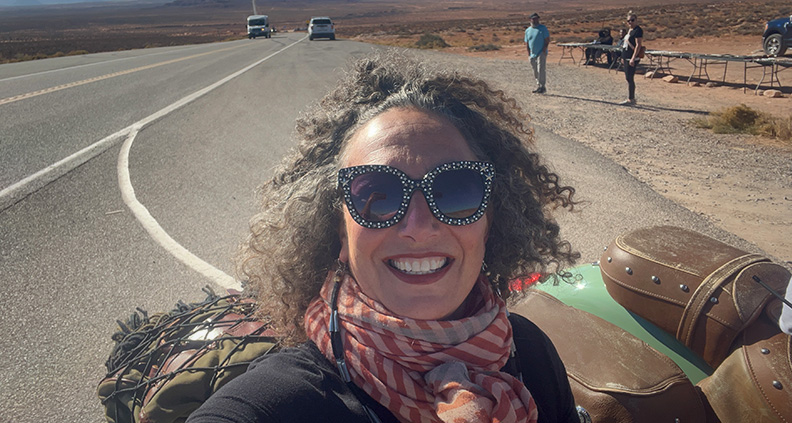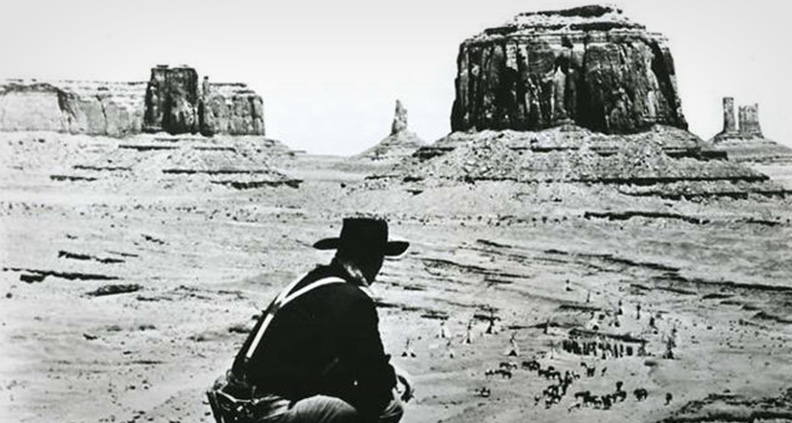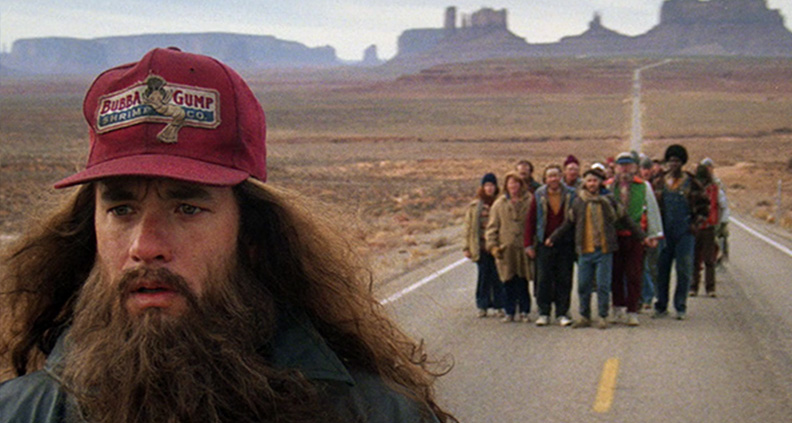But balancing responsible land use with tourism and commercial exploitation is forever a hot topic in Utah—a regular theme in Western states—and there are few exceptions made for the arts. Which is why collaboration with the steady guiding hand of local film commissions is so critical; someone to steer visiting filmmakers in the correct direction (both legally and creatively) and keep the reciprocal ecosystem of commerce between film crews and local businesses on the good foot. An assertive and fast-talking native New Yorker, Bega Metzner perhaps seems an unlikely steward of John Ford’s favorite Old West stomping ground. But the former fashion model and costume designer fell in love with Moab’s craggy red rocks decades ago, going from part-time resident to full-time head (and often sole staffer) of the Moab to Monument Valley Film Commission, the longest ongoing film commission in the world. Metzner is also, naturally, a proud Member of Film Independent. And this month’s Member Lens, we’re spotlighting her path from Manhattan to Grand County, Utah as well as her experiences as a filmmaker and community advocate.
BEGA METZNER
To start, tell me where you grew up. What was your family was like? Metzner: I was born and raised in New York City, on the Upper West Side. My mother is a fashion photographer and my father started as an art director and then went into TV commercial directing for many years, with his own production company and eventually started the Digital Media Department at SVA. So I grew up with very creative people—many brothers and sisters as well, a lot of who actually ended up working in the industry. My brother’s a screenwriter and showrunner. One of my sisters used to be the editor of a fashion magazine. It was a world of creative visual arts that I was embedded into. What was your media diet like growing up? Metzner: I didn’t really watch a lot of TV growing up, strangely. I always felt very left out of conversations. When people would talk about The Brady Bunch, I knew what that was, but not any of the details or the “inside jokes.” Was that because you weren’t interested, or was it because it was sort of discouraged? Metzner: The education I had kind of discouraged it. I went to a Waldorf School, which was more sort of artsy-craftsy. But we watched a lot of movies at home. Growing up I saw a lot of movies that really affected me that I probably shouldn’t have seen [laughs]. Like, my dad was watching The Elephant Man and said to me, “You gotta see this!” I liked watching [movies] but I never dug deep. I never studied it, I just consumed and absorbed. What career path did you initially think you’d pursue, then? Metzner: I was a Theater major at Skidmore College. I really loved the idea of being an actor, and I did a little bit of it—some off-off-Broadway stuff in New York. I went to a really incredible theater in Japan, actually, and studied under this very wonderful theater director named Anne Bogart. I was her assistant stage manager with the Japanese theater director there, who ran a place called the Suzuki Company of Toga (SITI) under Tadashi Suzuki. Like, avant-garde Japanese theater. And from there I went to a theater company in Massachusetts for two seasons to continue the method of training. But yeah, at some point I just didn’t want to be an actor anymore. I loved playing characters, but I just didn’t want the frustration of it. I was very shy when I was a kid, believe it or not. When did Moab and Southern Utah enter the picture? Metzner: I first came here [Moab] on a photo shoot with my mother as a model back in 1989. It was a calendar of 6 photographs for Mitsubishi: photos of a women against different environments, no car involved [laughs]. And barely anyone had ever heard of this place. It just wasn’t a thing, at least not from the New Yorker side of things. My brother was actually my mom’s first assistant on that shoot. It was dawn one morning and we were looking out over the Colorado River to the mesas in the distance and we both pointed into the distance and said, “Mom, we want to live there.” Wow. As simple as that? Metzner: Yeah! Somehow she ended up finding who owned that land and convincing them to sell her some land by writing letters and sending her photo books and explaining how she wanted to keep it magical and not develop it in any way. So her and my dad put up a little Airstream trailer on there with hopes to build someday. So my brothers and sisters and I started coming out here when we were the age to start having summers away from New York. We were country kids just as much as city kids; the best of both worlds. My first job out here was a wrangler at a guest ranch, taking people around on horses during the day and working in the lodge restaurant in the evenings and camping out on the sheriffs property… With his permission of course. At what point did you start working in the film industry? Metzner: I’d been back in New York for a couple years, working as a casting and fine art director for my mother, casting for her shoots, dealing with her galleries. And at a certain point I just needed something different than what I’d been doing for a while. I had a friend I’d met in Mexico on vacation who was supposedly making a movie in Los Angeles, so I called him up and said, “Hey, can I work on your movie?” I didn’t know how Hollywood worked! [laughs] So he calls me back and says “Yes, you can work on my movie. But you have to move to Los Angeles, you need to find a place to live, a car to drive, get to work on time… And don’t f**k up.” So I said “okay” and moved out. What year was this? Metzner: This was 1997. I went out and worked as a production assistant on a really awesome movie called Very Bad Things. Oh yeah—I love that movie. It’s so weird and dark and fun. Metzner: Yeah, I was wrangling extras and doing lock-up. I loved being a P.A. and I ended up talking to the costume designer and hanging out a lot at the wardrobe truck. And she just really liked my sense of style and thought I was pretty neat. Her next job was in New York and she said, “Do you want to come home and try being part of the wardrobe department as my shopper?” So I went to New York with her and did a movie called Rounders. Another great movie. Metzner: We worked together for about 6 years and eventually parted ways and I ended up working in the world of independent wardrobe styling, set costuming and eventually costume designing. I didn’t just do movies; I did everything—fashion, commercials, TV—because it kept it more interesting. And always during my down time, I kept coming back to Moab. I had a kid here almost 18 years ago and I’ve raised him here mostly, though I was gone a lot of the time because I was working on a TV show called Blue Bloods. That’s basically the last thing I did before I started film commissioning. And how exactly did “film commissioning” begin? Metzner: That sort of happened because every time I would come back to Moab in my downtime I’d go to this office-y thing that was called a “film commission”—which I didn’t really understand—and I’d be like: “I hear you help people get on projects when there are movies or commercials coming to town.” So I started helping out part-time when I wasn’t out of town shooting Blue Bloods. At a certain point my predecessor resigned due to health issues and the city of Moab asked if I wanted to become the director. So now it’s no longer part time, it’s all the time, 24/7. The word “passionate” is probably not even strong enough. I really love what I do and I love the people I work with. I try to treat every person or every project that comes into the area the same way, whether it’s a college short or a small independent feature, reality show or major motion picture. Tell us about the Moab to Monument Valley Film Commission in general. Metzner: The Moab to Monument Valley Film Commission is the longest running film commission in the world. It started here in 1949 to help facilitate these John Ford movies that were coming here; this epic, iconic environment. Since then, over 200 films have been shot in the area. I try as a film commission Director to just make sure that everyone is doing it the right way. Like, you know you want to shoot here, but there are permits and things that need to happen. So much of the land in Moab and Monument Valley that I represent is public land—National Parks, State Parks, the Bureau of Land Management. There’s a lot to juggle. Every project has different needs, not just with locations but with accommodations or casting or wanting to hire local crew… My job is to facilitate whatever aspects are needed and try to make it as seamless as possible whatever the needs are. Lastly, when did you first become aware of Film Independent as an organization? Metzner: I wish I could remember. It was maybe at a film festival or something? I do go to Sundance every year because as a regional film commission office I represent the home state (Utah.) But I just have a lot of friends who are independent filmmakers as writers, directors and producers, so it just sort of happened that I knew about it. I just think it’s super cool and I want to support the organization in any way I can. I’m really glad that I’m part of this, too, because I get to see things I wouldn’t normally wouldn’t get to see through Spirit Award screeners and things like that. So if I can support Film Independent like I have been—and continue to—then I will.
To become a Member of Film Independent—and possibly be featured in a future edition of Member Lens—click here. To support our work with a tax-deductible donation, please visit our donations page. Film Independent promotes unique independent voices by helping filmmakers create and advance new work. To become a Member of Film Independent, just click here. To support us with a donation, click here.
Keep up with Film Independent…
Twitter Instagram Facebook YouTube Events Letterboxd Newsletter
(Header: the upcoming Horizon, directed by Kevin Costner)


